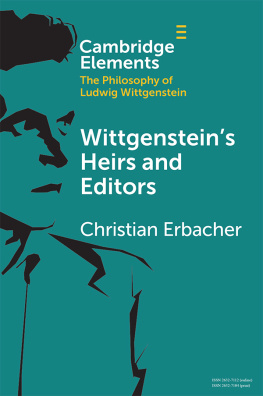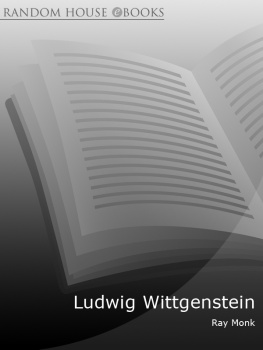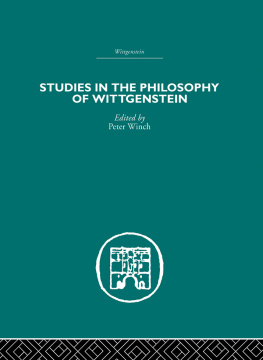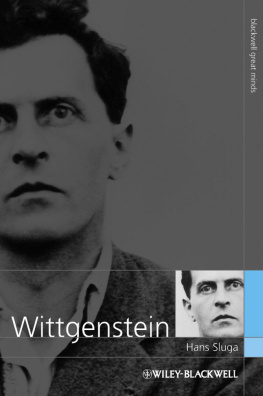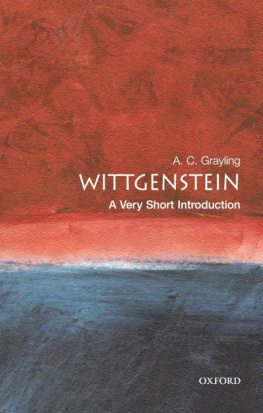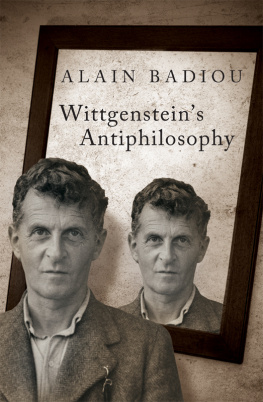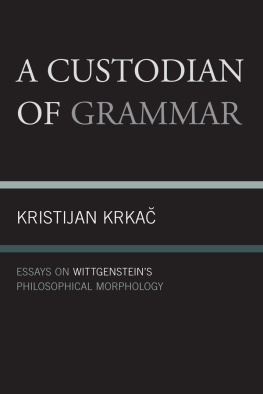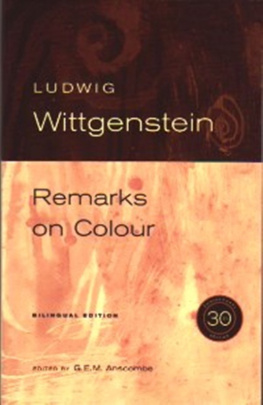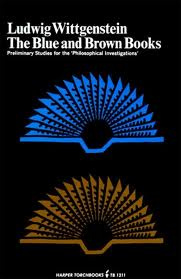Erbacher - Elements in the Philosophy of Ludwig Wittgenstein: Wittgenstein’s Heirs and Editors
Here you can read online Erbacher - Elements in the Philosophy of Ludwig Wittgenstein: Wittgenstein’s Heirs and Editors full text of the book (entire story) in english for free. Download pdf and epub, get meaning, cover and reviews about this ebook. year: 2020, publisher: Cambridge University Press, genre: Religion. Description of the work, (preface) as well as reviews are available. Best literature library LitArk.com created for fans of good reading and offers a wide selection of genres:
Romance novel
Science fiction
Adventure
Detective
Science
History
Home and family
Prose
Art
Politics
Computer
Non-fiction
Religion
Business
Children
Humor
Choose a favorite category and find really read worthwhile books. Enjoy immersion in the world of imagination, feel the emotions of the characters or learn something new for yourself, make an fascinating discovery.
Elements in the Philosophy of Ludwig Wittgenstein: Wittgenstein’s Heirs and Editors: summary, description and annotation
We offer to read an annotation, description, summary or preface (depends on what the author of the book "Elements in the Philosophy of Ludwig Wittgenstein: Wittgenstein’s Heirs and Editors" wrote himself). If you haven't found the necessary information about the book — write in the comments, we will try to find it.
Erbacher: author's other books
Who wrote Elements in the Philosophy of Ludwig Wittgenstein: Wittgenstein’s Heirs and Editors? Find out the surname, the name of the author of the book and a list of all author's works by series.
Elements in the Philosophy of Ludwig Wittgenstein: Wittgenstein’s Heirs and Editors — read online for free the complete book (whole text) full work
Below is the text of the book, divided by pages. System saving the place of the last page read, allows you to conveniently read the book "Elements in the Philosophy of Ludwig Wittgenstein: Wittgenstein’s Heirs and Editors" online for free, without having to search again every time where you left off. Put a bookmark, and you can go to the page where you finished reading at any time.
Font size:
Interval:
Bookmark:


Elements in the Philosophy of Ludwig Wittgenstein
edited by
David G. Stern
University of Iowa
Wittgensteins Heirs and Editors
Christian Erbacher
University of Siegen


University Printing House, Cambridge CB2 8BS, United Kingdom
One Liberty Plaza, 20th Floor, New York, NY 10006, USA
477 Williamstown Road, Port Melbourne, VIC 3207, Australia
314321, 3rd Floor, Plot 3, Splendor Forum, Jasola District Centre, New Delhi 110025, India
79 Anson Road, #0604/06, Singapore 079906
Cambridge University Press is part of the University of Cambridge.
It furthers the Universitys mission by disseminating knowledge in the pursuit of education, learning, and research at the highest international levels of excellence.
www.cambridge.org
Information on this title: www.cambridge.org/9781108813204
DOI: 10.1017/9781108878111
Christian Erbacher 2020
This publication is in copyright. Subject to statutory exception and to the provisions of relevant collective licensing agreements, no reproduction of any part may take place without the written permission of Cambridge University Press.
First published 2020
A catalogue record for this publication is available from the British Library.
ISBN 978-1-108-81320-4 Paperback
ISSN 2632-7112 (online)
ISSN 2632-7104 (print)
Cambridge University Press has no responsibility for the persistence or accuracy of URLs for external or third-party internet websites referred to in this publication and does not guarantee that any content on such websites is, or will remain, accurate or appropriate.
Wittgensteins Heirs and Editors
Elements in the Philosophy of Ludwig Wittgenstein
DOI: 10.1017/9781108878111
First published online: September 2020
Christian Erbacher
University of Siegen
Author for correspondence: Christian Erbacher,
Abstract: Ludwig Wittgenstein is one of the most widely read philosophers of the twentieth century. But the books in which his philosophy was published with the exception of his early work Tractatus Logico-Philosophicus were posthumously edited from the writings he left to posterity. How did his 20,000 pages of philosophical writing become published volumes? Using extensive archival material, this Element reconstructs and examines the way in which Wittgensteins writings were edited over more than fifty years, and shows how the published volumes tell a thrilling story of philosophical inheritance. The discussion ranges over the conflicts between the editors, their deviations from Wittgensteins manuscripts, other scholarly issues which arose, and also the shared philosophical tradition of the editors, which animated their desire to be faithful to Wittgenstein and to make his writings both available and accessible. The Element can thus be read as a companion to all of Wittgensteins published works of philosophy.
Keywords: history of analytical philosophy, scholarly editing, Rush Rhees, Elizabeth Anscombe, Georg Henrik von Wright
Christian Erbacher
ISBNs: 9781108813204 (PB), 9781108878111 (OC)
ISSNs: 2632-7112 (online), 2632-7104 (print
This book is not about Ludwig Wittgensteins philosophy. It is about his literary heirs and editors and how they made the books the world has come to know as Wittgensteins later works. The one philosophical book published during his lifetime (in 1922) was the Tractatus Logico-Philosophicus. In 1929, Wittgenstein returned to philosophical writing and created an oeuvre of 20,000 pages during the subsequent twenty-one years. When he died in 1951, the copyright to this philosophical work was passed on to three of his students and friends. Wittgensteins wish was that they publish what they thought fit. This is the starting point for the present Element. It sketches what happened to Wittgensteins writings on their journey into the public sphere, from the day of his death in 1951 until the death of the last of the three literary heirs in 2003. Given that their editorial interventions are not always obvious in the printed volumes, the account presented in this Element could also serve as an editorial note to the study of Wittgensteins philosophy.
The main source for the story presented here is the extensive correspondence between Wittgensteins literary heirs: Rush Rhees, Georg Henrik von Wright and Elizabeth Anscombe. I have had the good fortune to study these fascinating documents of philosophical inheritance for more than ten years. I wish all young scholars a similarly rich adventure in reading and research.
Imagine that you have inherited the papers of your philosophical mentor and have been instructed to publish from them what you think fit. What are your guidelines for deciding what to publish?
Would you try to think about what your mentor would have consented to publishing or would you maybe consult an archivist or scholarly editor who could tell you how to handle your deceased mentors writings in a professional way? If you choose the latter, would it irritate you that your mentor appointed you for the task and not an institution with a professional staff? Would passing on the task to a professional do justice to your mentors will? By the same token, if you choose to let your own judgement rule, which parts of your mentors writings should be made available and would your justification suffice? If your mentor is a philosopher of considerable interest, would it be irresponsible not to follow the method recommended by the professional scholarly editor? But then again, what does professional mean in the context of your mentors philosophy?
Such were the questions that Rush Rhees, Elizabeth Anscombe and Georg Henrik von Wright were confronted with as soon as they became Ludwig Wittgensteins literary heirs in April 1951. They were appointed in Wittgensteins will with these words:
I give to Mr. R. Rhees, Miss Anscombe and Professor G. H. von Wright of Trinity College Cambridge all the copyright in all my unpublished writings and also the manuscripts and typescripts thereof to dispose of as they think best but subject to any claim by anybody else to the custody of the manuscripts and typescripts.
I intend and desire that Mr. Rhees, Miss Anscombe and Professor von Wright shall publish as many of my unpublished writings as they think fit, but I do not wish them to incur expenses in publication which they do not expect to recoup out of royalties or other profits.
With these sentences, Wittgenstein ensured that his notebooks, ledgers, typescripts and collections of clippings would be taken care of about 20,000 pages of philosophical writing a corpus that scholars refer to as Wittgensteins Nachlass .
As of today, the entire Nachlass is available in an electronic edition and parts of it are presented in dozens of printed volumes. A scholarly milieu has also evolved, allowing for research on Wittgensteins writings, their history, the structure of the Nachlass and critical comparisons of manuscripts and published volumes. Hence, the story you are about to read of the posthumous editing that began with Wittgensteins own wish to have his texts published is a success story: it reflects a continuous movement towards the greater accessibility of Wittgensteins work. But as you will see, the process of editing and publishing Wittgensteins papers was also a continuation of Wittgensteins own struggle to make his work available in the right way.
Font size:
Interval:
Bookmark:
Similar books «Elements in the Philosophy of Ludwig Wittgenstein: Wittgenstein’s Heirs and Editors»
Look at similar books to Elements in the Philosophy of Ludwig Wittgenstein: Wittgenstein’s Heirs and Editors. We have selected literature similar in name and meaning in the hope of providing readers with more options to find new, interesting, not yet read works.
Discussion, reviews of the book Elements in the Philosophy of Ludwig Wittgenstein: Wittgenstein’s Heirs and Editors and just readers' own opinions. Leave your comments, write what you think about the work, its meaning or the main characters. Specify what exactly you liked and what you didn't like, and why you think so.

